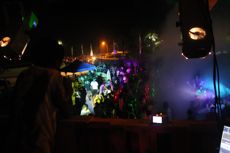As Addu moves forward with SAARC preparations, local artists are also recommending a look at the past.
The Addu Cultural Center is the first historical replica village in the region, and the second in the Maldives. Founders Saifulla Hameed, Ibrahim Fariq and Min Haj said it serves three purposes: to respect the elderly, to remind the youth, and to introduce tourists to Maldivian heritage.
“Even now, people are visiting the center,” said Project Director Hameed. “They are shocked when they see this replica of how Maldivians lived years ago. For the older generation who remember this lifestyle, it’s like traveling back in time, and they are especially happy to see this. We also plan to invite schools to educate the young people.”
Construction of the center began six months ago, and is due for completion in time for the SAARC Summit, which starts on November 10.
The center includes seven buildings made from palm materials: a blacksmith, a living area, a bathroom, a 60-year-old koda dhoni, a kitchen, a school and a historical display room. A garden is also being cultivated. Buildings are furnished with original artifacts. Local crafts will be sold in one display building as souvenirs.
As SAARC approaches, the centre’s finishing touches are being made during any possible moment.
“It is hard to work because most people are preparing for the summit, but we work at night or during the day, when people are available,” said Hameed.
Project Partner Ibrahim Firaq began collecting artifacts at age 16; he is now 47. The Cultural Centre is the first opportunity he has had to make use of his collection.
“It was one of my dreams to put the collection on public display. I can’t even sleep, I am so eager to open this place,” he said.
Firaq’s collection includes coal-blowers, traditional cookware, rope bed frames, boat building tools and more. Many items, such as colonial clocks, European pottery and Arab tea and coffee pots, indicate the importance of international trade to the Maldives.
building tools and more. Many items, such as colonial clocks, European pottery and Arab tea and coffee pots, indicate the importance of international trade to the Maldives.
The collection will be used by a team of 20 staff who will “live” in the village.
“We have been training these workers to work, live and behave appropriately to illustrate a traditional lifestyle,” said Hameed. “The elderly picked it up easily, since many have actually lived like this when they were younger. But the younger workers need training.”
Hameed said he had developed the concept years ago, but applications for funding were previously rejected. Recent council elections and SAARC preparations paved the way for funding and expansion.
The centre is privately funded, and supplemented by a government contribution. Hameed said growing interest in developing Addu as a tourist destination has made the centre more significant.
“People staying at resorts have nice food and activities, but there isn’t much to see on those islands. Now, with more paved roads and things to see in Addu, there will be more reason to come here,” said Hameed, who looks forward to the attention that Addu is expected to receive during and after SAARC.
Addu atoll features a mere two resorts and two local hotels; council officials called accommodation a development priority. Mayor Abdullah Sodiq however said Addu offers unique opportunities for tourism within the Maldives.
“Addu is unlike other areas in that it offers places to visit. The remains of the British royal air force can be of interest to Europeans, and the Commonwealth War Grave is interesting to Commonwealth countries,” said Sodiq. “We also offer a protected marine area, as well as excellent diving.”
The Cultural Centre’s team also reported local interest in opening art galleries, crafts markets and Maldivian restaurants.
Haj said Addu should use the new convention center for more than just business events.
“Right now, Addu needs more accommodation to really host big conventions. I’m not sure that they’ll get more than two events a year. They should use the center for exhibitions, concerts or plays,” he suggested.
Few Maldivian schools boast artistic and cultural studies as a strong point. The government, however, has taken steps to foster cultural awareness.
Maldives Hulhevi Media Project recently began the first digital recording and documentary of the traditional Buruni Ballad, funded by the United States Embassy.
In September, the government announced plans to sign the UNESCO Convention for the Safeguarding of Intangible Cultural Heritage. Deputy Minister for Tourism, Arts and Culture, Mamduh Waheed, said at the time that protecting cultural heritage would improve tourism in the Maldives. “We have a market for the natural aspect of the Maldives, and now we will be able to add cultural attractions and destinations. I think it will draw tourists interested in cultural conservation,” he observed.
Recently, a UN State of the World report found that over half of the global population was under the age of 25. One-quarter of the Maldives’ population is aged between 15 and 24, with a quarter of the young men and half of the young women reported as unemployed.
Vice President of the Maldives Dr Mohamed Waheed Hassan recommended creating more job opportunities in the atolls.
Deputy Minister of Finance Haifa Naeem said it was important to “diversify jobs to attract the youth market, in fields such as arts and culture.”
The SAARC summit will be preceded by several days of festivities by local and international dance, music and sports groups.

